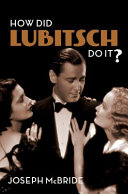2018 School Spending Survey Report
How Did Lubitsch Do It?
How Did Lubitsch Do It? Columbia Univ. Jun. 2018. 544p. photos. filmog. notes. index. ISBN 9780231186445. $40; ebk. ISBN 9780231546645. FILM
COPY ISBN
 Director Ernst Lubitsch (1892–1947) spent his early years in Germany working as an actor and director, eventually leaving for more opportunities and greater creative freedom in Hollywood. Once in America, he switched from spectacles to frothy musical fantasies and comedy, employing his "Lubitsch touch" mixing sophistication, irony, and a distinctive sexy, romantic view of the relations between the sexes, all while circumventing censorship with an indirect approach. Film historian McBride (San Francisco State Univ.; Searching for John Ford: A Life; What Ever Happened to Orson Welles?) pens a thoughtful critical study, calling Lubitsch a master craftsman of classics such as Ninotchka and Trouble in Paradise, even employing comedy in the anti-Nazi satire To Be or Not To Be. The arrival of sound films allowed Lubitsch to use clever wordplay and innovative techniques to confound critics and censors who called him vulgar and frivolous. McBride quotes admirers François Truffaut and Orson Welles as well as colleagues such as Jeannette MacDonald and Mary Pickford.
Director Ernst Lubitsch (1892–1947) spent his early years in Germany working as an actor and director, eventually leaving for more opportunities and greater creative freedom in Hollywood. Once in America, he switched from spectacles to frothy musical fantasies and comedy, employing his "Lubitsch touch" mixing sophistication, irony, and a distinctive sexy, romantic view of the relations between the sexes, all while circumventing censorship with an indirect approach. Film historian McBride (San Francisco State Univ.; Searching for John Ford: A Life; What Ever Happened to Orson Welles?) pens a thoughtful critical study, calling Lubitsch a master craftsman of classics such as Ninotchka and Trouble in Paradise, even employing comedy in the anti-Nazi satire To Be or Not To Be. The arrival of sound films allowed Lubitsch to use clever wordplay and innovative techniques to confound critics and censors who called him vulgar and frivolous. McBride quotes admirers François Truffaut and Orson Welles as well as colleagues such as Jeannette MacDonald and Mary Pickford.
VERDICT Though some early Lubitsch films are lost, McBride rescues the director's neglected and underrated reputation, securing his legacy with critical insights and sound scholarship in one of the few full-length appreciations of the artist. Highly recommended.
RELATED
ALREADY A SUBSCRIBER? LOG IN
We are currently offering this content for free. Sign up now to activate your personal profile, where you can save articles for future viewing




Comment Policy:
Comment should not be empty !!!